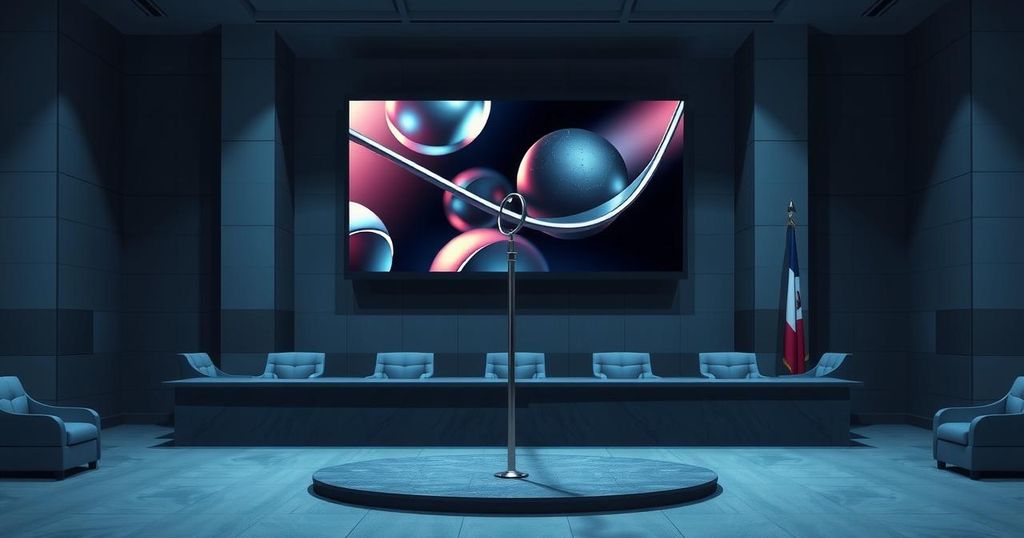Crime
ASIA, CNN, CORRUPTION ALLEGATIONS, COURT, CRIME, DAVAO, DAVAO CITY, DAVAO DEATH SQUAD, DUBAI, DUTERTE, EUROPE, EXTRADITION, GRAFT, HAGUE, ICC, INTERNATIONAL CRIMINAL, INTERNATIONAL CRIMINAL COURT, JUSTICE, LEGAL SYSTEM, MANILA, MEDIALDEA, MOTOC, NETHERLANDS, PHILIPPINES, RODRIGO DUTERTE, SALVADOR MEDIALDEA, UNITED ARAB EMIRATES
Elena Martinez
0 Comments
Former President Duterte Faces Charges at ICC for ‘War on Drugs’
Former Philippines President Rodrigo Duterte appeared via video link at the ICC in The Hague on murder charges related to his anti-drug campaign, where he faces accusations of crimes against humanity. His legal representation has expressed concerns over his health, but a court doctor affirmed his fitness. Human rights groups perceive this as a significant step towards justice for victims, despite Duterte’s defiant stance.
Former President Rodrigo Duterte of the Philippines has recently made his debut appearance via video link at the International Criminal Court (ICC) in The Hague, where he faces charges of murder linked to his controversial anti-drug campaign. This appearance occurred at approximately 2:30 p.m. local time, wherein Duterte was briefed on the charges against him and informed of his rights, as per ICC statements.
At 79 years of age, Duterte, who was taken from Manila, has been accused of committing “murder as a crime against humanity” during his extensive campaign over the years in which a significant number of individuals were reported killed. The ICC judges permitted his remote appearance due to the lengthy travel required, accommodating the considerable time zone difference.
According to reports, after being deported from Manila late Tuesday, Duterte arrived in the Netherlands the following day after a layover in Dubai, where he received medical attention. His attorney, Salvador Medialdea, stated in court that Duterte’s return was a result of an “extrajudicial rendition” and described it as a “pure and simple kidnapping.” Medialdea expressed concerns regarding Duterte’s alleged serious health issues, asserting they would impede his ability to participate in the hearing. However, Judge Motoc contested this, citing information from a court doctor affirming Duterte’s mental clarity and fitness.
The ICC alleges that from November 1, 2011, to March 16, 2019, Duterte was responsible for the murder of at least 19 individuals labeled as drug dealers or thieves in relation to the Davao Death Squad, as well as 24 additional murders reportedly committed with law enforcement involvement during his presidency. Duterte’s administration from 2016 to 2022 was characterized by a violent anti-drug warfare, with police reports estimating 6,000 fatalities, while human rights organizations argue the figure could reach 30,000. Victims predominantly originated from impoverished neighborhoods subjected to violence by law enforcement and affiliated groups.
Only eight police officers have faced convictions for the killings associated with the campaign since Duterte stepped down in 2022, highlighting the limited accountability surrounding these events. Although Duterte withdrew the Philippines from the ICC in March 2019, the court maintains jurisdiction over acts that occurred during the country’s membership.
The significance of his appearance was underscored by Amnesty International, which has emphasized the ICC’s role in addressing severe human rights violations. They remarked that the court poised to try Duterte represents a significant step forward for impacted families and human rights advocates who have called for justice amidst perilous circumstances.
Prior to his arrival in the Netherlands, Duterte delivered a defiant message via social media, maintaining responsibility for his actions during the anti-drug campaign and expressing determination to continue serving his nation despite the impending legal proceedings.
This ongoing legal saga is reflective of the complexities surrounding justice, governance, and human rights within the global context.
In conclusion, Rodrigo Duterte’s initial court appearance at the ICC serves as a crucial milestone for the victims of his extensive anti-drug campaign. As he faces serious charges of murder classified as crimes against humanity, it highlights the potential for accountability even for high-ranking officials. Human rights organizations view this event as a beacon of hope for justice, emphasizing the need for ongoing scrutiny of state violence and the importance of legal mechanisms in addressing such grievous violations.
Original Source: www.kadn.com




Post Comment